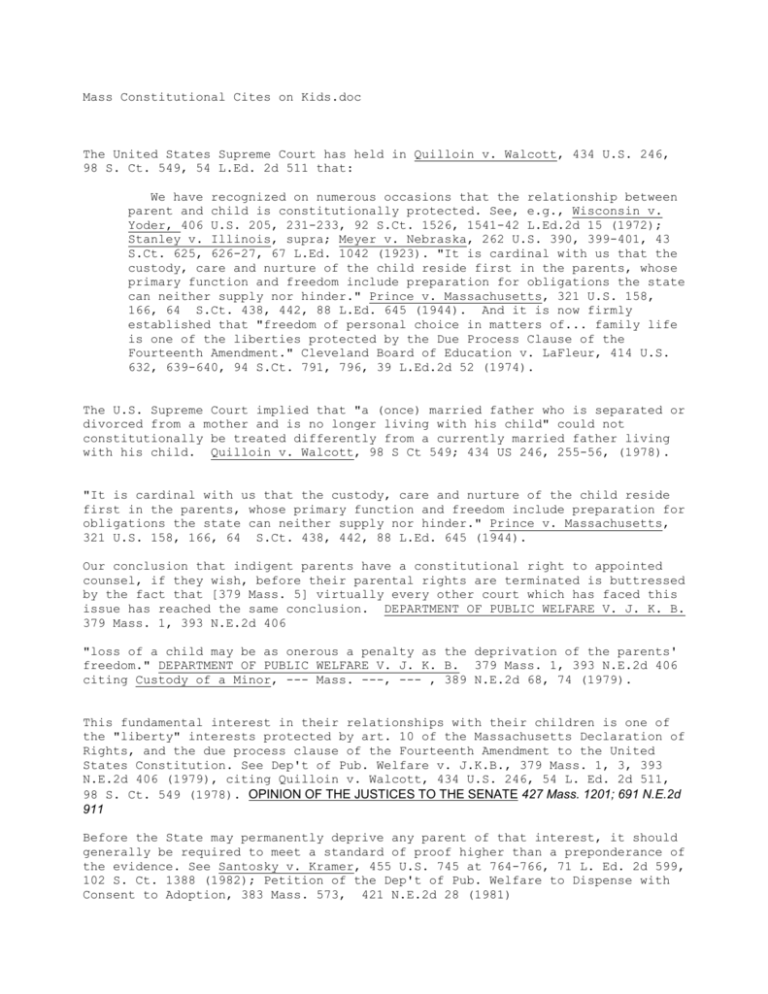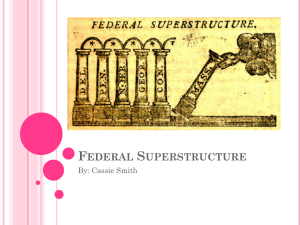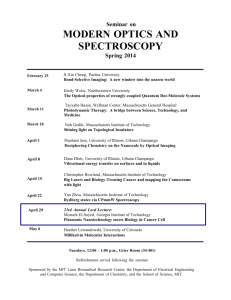The United States Supreme Court has held in Quilloin v
advertisement

Mass Constitutional Cites on Kids.doc The United States Supreme Court has held in Quilloin v. Walcott, 434 U.S. 246, 98 S. Ct. 549, 54 L.Ed. 2d 511 that: We have recognized on numerous occasions that the relationship between parent and child is constitutionally protected. See, e.g., Wisconsin v. Yoder, 406 U.S. 205, 231-233, 92 S.Ct. 1526, 1541-42 L.Ed.2d 15 (1972); Stanley v. Illinois, supra; Meyer v. Nebraska, 262 U.S. 390, 399-401, 43 S.Ct. 625, 626-27, 67 L.Ed. 1042 (1923). "It is cardinal with us that the custody, care and nurture of the child reside first in the parents, whose primary function and freedom include preparation for obligations the state can neither supply nor hinder." Prince v. Massachusetts, 321 U.S. 158, 166, 64 S.Ct. 438, 442, 88 L.Ed. 645 (1944). And it is now firmly established that "freedom of personal choice in matters of... family life is one of the liberties protected by the Due Process Clause of the Fourteenth Amendment." Cleveland Board of Education v. LaFleur, 414 U.S. 632, 639-640, 94 S.Ct. 791, 796, 39 L.Ed.2d 52 (1974). The U.S. Supreme Court implied that "a (once) married father who is separated or divorced from a mother and is no longer living with his child" could not constitutionally be treated differently from a currently married father living with his child. Quilloin v. Walcott, 98 S Ct 549; 434 US 246, 255-56, (1978). "It is cardinal with us that the custody, care and nurture of the child reside first in the parents, whose primary function and freedom include preparation for obligations the state can neither supply nor hinder." Prince v. Massachusetts, 321 U.S. 158, 166, 64 S.Ct. 438, 442, 88 L.Ed. 645 (1944). Our conclusion that indigent parents have a constitutional right to appointed counsel, if they wish, before their parental rights are terminated is buttressed by the fact that [379 Mass. 5] virtually every other court which has faced this issue has reached the same conclusion. DEPARTMENT OF PUBLIC WELFARE V. J. K. B. 379 Mass. 1, 393 N.E.2d 406 "loss of a child may be as onerous a penalty as the deprivation of the parents' freedom." DEPARTMENT OF PUBLIC WELFARE V. J. K. B. 379 Mass. 1, 393 N.E.2d 406 citing Custody of a Minor, --- Mass. ---, --- , 389 N.E.2d 68, 74 (1979). This fundamental interest in their relationships with their children is one of the "liberty" interests protected by art. 10 of the Massachusetts Declaration of Rights, and the due process clause of the Fourteenth Amendment to the United States Constitution. See Dep't of Pub. Welfare v. J.K.B., 379 Mass. 1, 3, 393 N.E.2d 406 (1979), citing Quilloin v. Walcott, 434 U.S. 246, 54 L. Ed. 2d 511, 98 S. Ct. 549 (1978). OPINION OF THE JUSTICES TO THE SENATE 427 Mass. 1201; 691 N.E.2d 911 Before the State may permanently deprive any parent of that interest, it should generally be required to meet a standard of proof higher than a preponderance of the evidence. See Santosky v. Kramer, 455 U.S. 745 at 764-766, 71 L. Ed. 2d 599, 102 S. Ct. 1388 (1982); Petition of the Dep't of Pub. Welfare to Dispense with Consent to Adoption, 383 Mass. 573, 421 N.E.2d 28 (1981) "In all controversies concerning property, and in all suits between two or more persons, except in cases in which it has heretofore been otherways used and practiced, the parties have a right to a trial by jury . . . ." Art. 15 of the Declaration of Rights of the Massachusetts Constitution Article 15 "must be construed with 'flexibility in its adaptation of details to the changing needs [*3] of society without in any degree impairing its essential character.'" Dalis v. Buyer Advertising, Inc., 418 Mass. 220, 222, 636 N.E.2d 212 (1994), quoting Bothwell v. Boston Elevated Ry., 215 Mass. 467, 473, RONALD P. ROSATI, JR., & another n1 vs. BOSTON PIPE COVERING, INC 102 N.E. 665 (1913) 434 Mass. 349; 749 N.E.2d 143; 144 Lab. Cas. (CCH) P59,329 The right to a jury trial is firmly rooted in both the Federal and our State Constitutions. See Sixth and Seventh Amendments to the United States Constitution; arts. 12 and 15 of the Declaration of Rights of the Massachusetts Constitution. DANIEL A. JAMGOCHIAN vs. PETER P. DIERKER & another , N.E.2d 212 (1994), 425 Mass. 565; 681 N.E.2d 1180 The Seventh Amendment to the United States Constitution does not apply to a State civil trial. Dalis v. Buyer Advertising, Inc., 418 Mass. 220, 223 n.4, 636 DANIEL A. JAMGOCHIAN vs. PETER P. DIERKER & another , N.E.2d 212 (1994), 425 Mass. 565; 681 N.E.2d 1180 "Although art. 12 deals with many matters related to the rights of criminals, it is not exclusively concerned with criminal matters. For example, art. 12 sets forth principles of due process of law applicable to civil, as well as criminal, actions in both a procedural . . . and a substantive sense." Commonwealth v. One 1972 Chevrolet Van, 385 Mass. 198, 199-200, n.1, 431 N.E.2d 209 (1982) "As a general rule, when State or Federal law entitles an individual meeting certain eligibility criteria to the receipt of a State or federally funded benefit, the individual has a property interest in the benefit." Madera v. Secretary of the Executive Office of Communities & Dev., 418 Mass. 452, 459, 461-462, 636 N.E.2d 1326 (1994)









